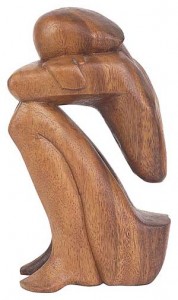When we talk to clients facing heart-wrenching decisions, we frequently hear apologies about their tears or distress. I always reply that, of course, it is okay and that there’s no need to apologize. However, my response never seems to do justice to just how acceptable and expected it is for them to be feeling so overwhelmed. Losing a pet can be devastating, and facing end-of-life decisions can be agonizing. The apologies I hear often bring to mind an old memory of a gentleman in a pet loss support group who gently said to an apologizing woman overwhelmed with grief and tears:
“You know, when you are drowning in a swamp full of alligators, nobody expects you to get out of there with grace.”
When faced with profound losses and devastating decisions, feeling overwhelmed is an incredibly normal and natural response – you are doing what you can to survive this moment. That man said it better than I’ve ever been able to, and his echoing words consistently remind me that a grieving heart needs compassion, patience and permission to grieve.
Burying your grief or pushing it aside won’t make the pain disappear or the process move more quickly. It seems that we often feel that if we’re attending to our grief, we’re somehow dwelling on our loss or failing to move on. In fact, it is usually just the opposite. Consider how we approach our physical ailments. If you break your leg, you give your body time to rest and heal. You may know that you will someday walk or even run again, but for now, you care for your body and listen to what it needs. It can help to envision your grief in much the same way.
Unfortunately, the grief we feel following the loss of a pet still lacks the social acceptance that other forms of grief are awarded, and we often have to claim our own time and space to grieve. It takes an extra step of courage and self-awareness to ask to take the day from work, to call a family member or friend to come watch your kids for an afternoon, or to simply allow yourself to cry when you feel the need to. As difficult as it can be to give yourself permission, it’s important to remember that your needs are worthy of the same patience and compassion you give those you love.
We have written before about how crying can help us physically express our grief. Tears, however, seem to be one of the most common things people feel the need to prevent or apologize for. Often, our worst fear is breaking down into tears at work, at a social gathering, or even in front of our children. Giving yourself permission to process and honor your grief involves listening to your body and working with the emotions you are feeling, rather than burying them or setting them aside for later. And sometimes people find that even just consciously giving themselves permission to feel overwhelmed and to express their sadness lifts a burden off their heart.
Remember, our society does not always support healthy grieving processes; most of us are conditioned to ignore, move on, and “get over it”. Once we step outside of those expectations, it’s easier to give ourselves the freedom and space to grieve, heal and grow. Sometimes we need help walking this path and claiming the space we need, and we may also need to give ourselves permission to look outside ourselves for help from family, friends, support groups or professionals.
Next week: Permission to Grieve, Part II (Permission to Heal)


26 Responses to Permission to Grieve, Part I